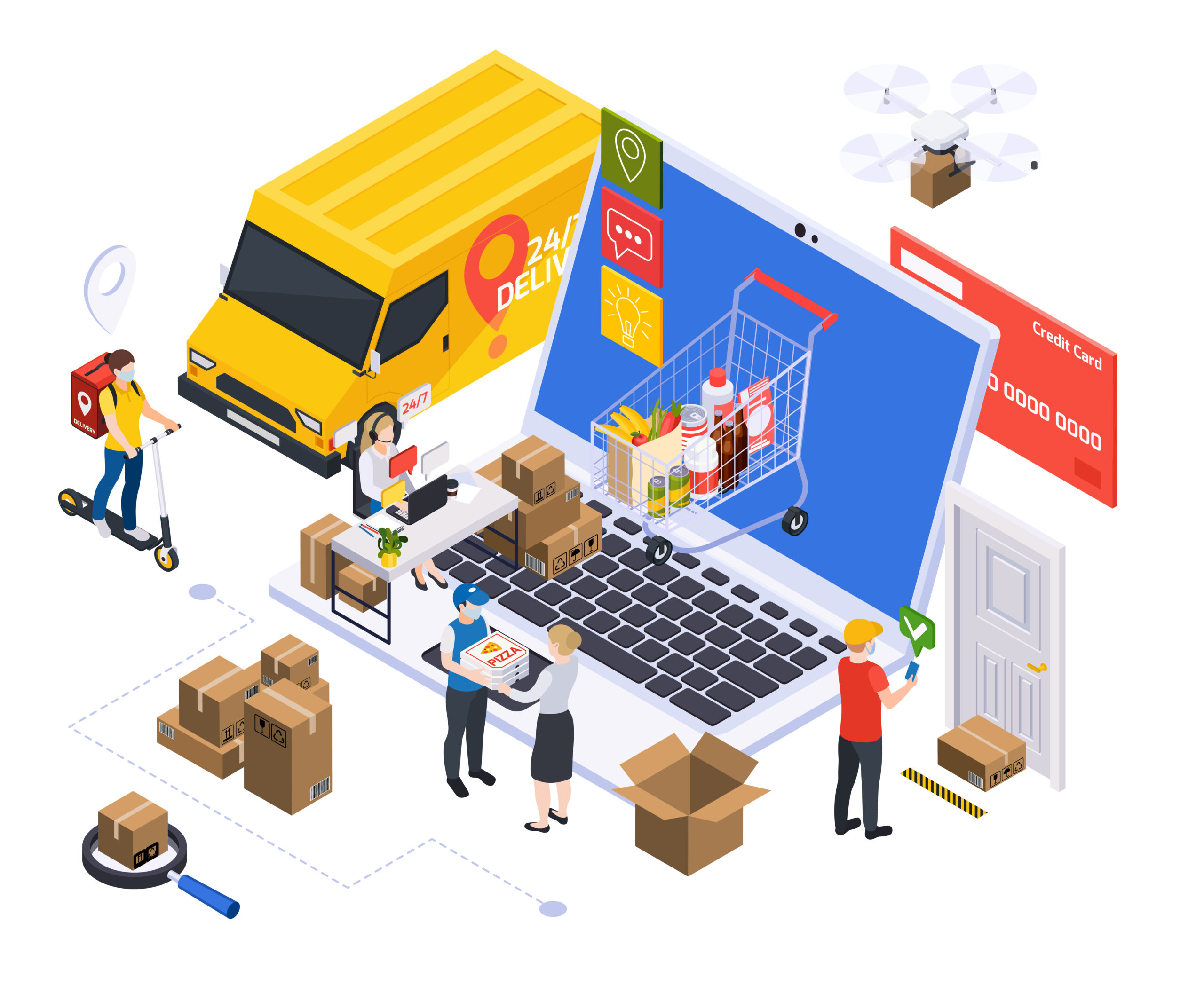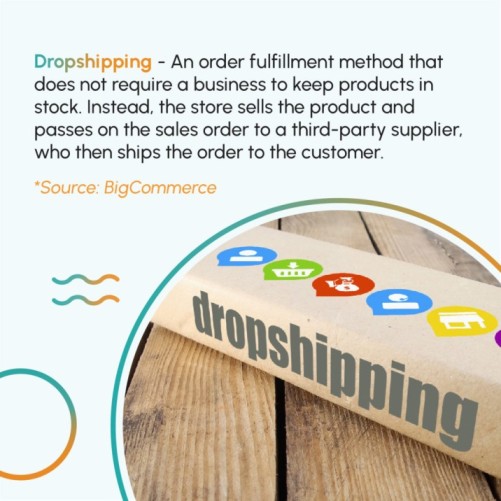
Dropshipping in eCommerce – The advantages and disadvantages
What constitutes a successful ecommerce business? A good range of products to put on sale, keeping adequate stock of those products, right pricing, a great platform to display and promote the products on, and finally, a successful marketing strategy – all that contribute to the success of a ecommerce business.
But it can be expensive to buy products in great numbers, store them in a warehouse and fulfil orders. If those expenses are exactly the ones stopping you from starting a successful ecommerce business, then dropshipping is for you.
What is dropshipping?
Dropshipping is a business model that eliminates the need for purchasing and keeping stock of the products you want to sell. It does not necessitate you to handle the products at any point of time.
Manufacturers/suppliers take care of managing the inventory, fulfilling the order and shipping the product directly to the customer, while the ecommerce business merely focuses on marketing the products and finding new customers.

How does dropshipping work and how can you start a dropshipping business?
Following are the steps to start and run a successful dropshipping business.
- 1. Start by building a well-designed, user-friendly ecommerce site.
- 2. Choose the products you want to sell, based on the market demand and competitor analysis.
- 3. Sift through manufacturers and suppliers on B2B listings and contact suitable manufacturers/suppliers.
- 4. Sign a contract with the manufacturers/suppliers agreeing on the price, responsibilities and obligations, and other terms and conditions.
- 5. List the products on your ecommerce store with an added margin.
- 6. Market them aggressively using various means such as offers to customers through email marketing.
- 7. Find new customers.
- 8. Let customers place orders on the site.
- 9. Manufacturer/supplier gets the order details.
- 10. The manufacturer/supplier processes the order, packs and ships the products directly to the customer.
- 11. Coordinate with the manufacturer/supplier to get updates and ensure a smooth fulfilment of the order.
- 12. The manufacturer updates inventory and product availability.
- 13. As per the contract, you pay the manufacturer/supplier for the products that the customer ordered on your site, and take your share of profit.
- 14. Analyze the insights to take informed business decisions and achieve data-driven growth.
What are the advantages and disadvantages of dropshipping?
Dropshipping is a business model that eliminates the need for purchasing and keeping stock of the products you want to sell. It does not necessitate you to handle the products at any point of time.
Manufacturers/suppliers take care of managing the inventory, fulfilling the order and shipping the product directly to the customer, while the ecommerce business merely focuses on marketing the products and finding new customers.
What are the advantages and disadvantages of dropshipping?
As with any business model, there are both advantages and disadvantages in dropshipping.
Advantage

1. You can start right away
Unlike conventional businesses, you can start a dropshipping business quickly without planning and pooling resources. You do not have to:
- Buy and stock the products
- Own or manage a warehouse
- Employ a large number of staff
- Pack the products and ship them to customers
- Manage inventory
- Manage issues with regard to shipping and product returns/refund
2. It is not capital-intensive
Traditional businesses spend so much resources in establishing and setting up their operations. When the expensive components of the business, namely office space, warehouse, purchasing products, inventory management and shipping, are taken out of the equation, an ecommerce business just needs investment in a good website for online storefront.
3. You can focus on your strengths
Dropshipping frees you from the responsibilities of a typical retail business and lets you focus solely on your marketing efforts and communication with supplier/manufacturer. This helps you achieve more without any distractions.
4. It is easy and inexpensive to manage
Unlike a traditional business, the running costs of a dropshipping business is low, as you do not have to purchase and stock products at any point of time. It is also easy to manage, as the critical operations of inventory management and shipping are outsourced to the manufacturers/suppliers
5. Expand with ease
Scaling in dropshipping merely means finding a new supplier or listing new products in the ecommerce site. It is possible to scale up in dropshipping without additional effort or investment
6. You can sell anything from anywhere, at any time
Dropshipping makes it possible to operate without any physical office, as you can manage the ecommerce store from anywhere, at a convenient time, and sell anything that is allowed.
7. You can afford to try and fail
In dropshipping, you can always afford to test the waters and see whether your target customers like a particular product or not. If customers do not show interest, you can quickly retract a product from sale without suffering losses.
Disadvantages
1. Margins are tight
When you outsource the critical operations of a business to the manufacturer/supplier, the profit margins in each of those operations are steadily chipped away, and you get much less in return. Also, there will be a lot of competition. In order to be successful, it is vital to choose products that have high demand and less competition in the market at the same time.
2. You do not have much say
Since the products are made, stored and shipped by a manufacturer/supplier, you do not have much control over inventory management or shipping. For instance, if you speculate a rise in demand, the manufacturer/supplier may not necessarily stock products based on your estimates.
3. Order management is a challenge
Managing an order with products sourced from different manufacturers/suppliers, coordinating with them and getting them all to ship the products to a customer on time without any issues is challenging. Separate shipping costs can also add up. You can keep a small amount of select products in stock as a buffer to equalize demand and product availability.
4. Resolving issues can be difficult
If there is a problem with the product quality or shipping, or if the customer wants to return the product and get a refund, it is left in the hands of the manufacturer/supplier to manage and resolve issues smoothly. Mismanagement can lead to loss of trust for reasons that are beyond your control. So, it is essential to find a highly reliable supplier/manufacturer.
Platforms that support dropshipping
Dropshipping features can be seamlessly integrated with ecommerce stores through plugins offered by the platforms. These plugins help you directly import product listings created by a manufacturer/supplier in popular B2B classifieds sites. Features related to inventory updates, order tracking, price mark-up, etc., can also be added. Following are some of the Ecommerce platforms that provide good dropshipping support
- BigCommerce
- Shopify
- Magento
- WooCommerce
- OpenCart
- Spocket
Benefits of BigCommerce dropshipping
BigCommerce is a trusted ecommerce platform with more than 150,000 stores built on it. It provides comprehensive set of plugins for integrating dropshipping capabilities.
- 1. BigCommerce is easy to setup, and customize. It helps you design the site to your requirements and attract more customers, which is important for dropshopping.
- 2. BigCommerce provides powerful tools to manage marketing campaigns and push suitable offers to customers.
- 3. BigCommerce is highly capabale when it comes to data analytics. Equipped with the right data, you can reach new customers and serve existing customers with the right products to achieve conversion and growth.
- 4. The SEO tools available in BigCommerce help you make the site findable to new customers on search engines.
- 5. BigCommerce offers safety and security to make business interactions and transactions between the customer, manufacturer and you highly secure.
- 6. BigCommerce offers comprehensive set of dropshipping plugins for product listing, order management, payment, inventory management, order tracking and shipment.




